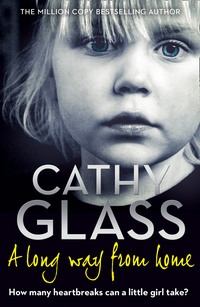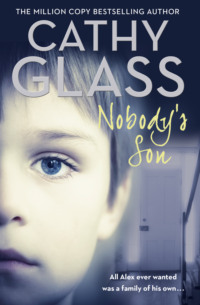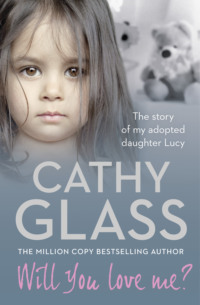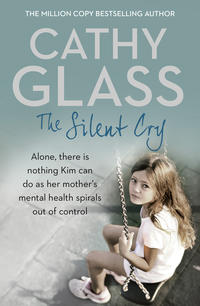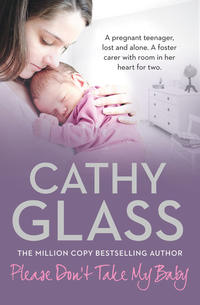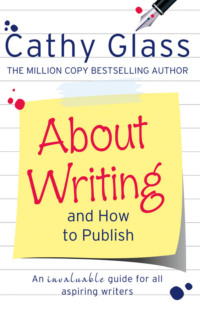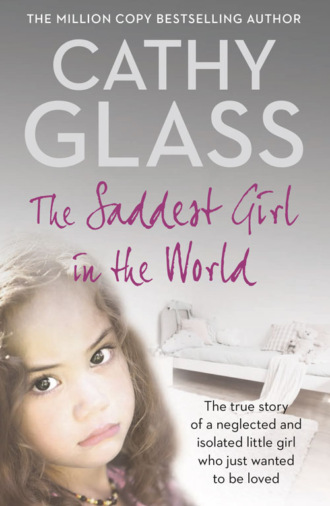
Полная версия
The Saddest Girl in the World
Once in the park, Adrian cycled up and down the cycle paths, aware that, as usual, he had to stay within sight of me. ‘If you can see me, then I can see you,’ I said to him as I said each time we brought his bike to the park. Even so, I had one eye on him while I pushed Paula on the swings and kept my other eye on ‘the baby’ in the pram as Paula had told me to.
I thought of Donna as Paula swung higher and higher in front of me with little whoops of glee at each of my pushes. I thought of Donna's profile as I had seen her at the bottom of our garden, slumped, dejected and going through the motions of entertaining Paula. I would have to make sure that Paula didn't ‘put on’ Donna, for I didn't want Donna to feel she had to entertain or play with Paula, or Adrian for that matter, although this was less likely. Something in Donna's compliance, her malleability, had suggested she was used to going along with others' wishes, possibly to keep the peace.
Paula swapped the swing for the see-saw, and I sat on one end and she on the other. As I dangled her little weight high in the air to her not-very-convincing squeals of ‘Put me down’, I felt a surge of hope and anticipation, an optimism. I was sure that when Donna came to stay with us, given the time and space, care and attention she clearly so badly needed, she would come out of her shell and make huge progress, and I could visualise her coming here to play. I also thought that Donna was going to be a lot easier to look after than some of the children I had fostered. She didn't come with behavioural difficulties — kicking or screaming abuse, for instance — and certainly wasn't hyperactive; and if Mary did have a bruise on her arm, I now smugly assumed it was because she and Ray had mishandled the situation when they had been trying to bath the boys. Had they allowed Donna to help a little, instead of trying to forcibly remove her from the bathroom, I was sure the whole episode could have been defused. Like so many situations with children, fostered or one's own, it was simply, I thought, a matter of handling the child correctly — giving choices and some responsibility, so that the child felt they had a say in their lives.
I had a lot to learn!
We ate at 5.00 p.m., earlier than usual, so that I could clear away and be ready for Donna's expected arrival soon after 6.00. We'd had chicken casserole and I had plated up some for Donna, which I would re-heat in the microwave if she was hungry. After she had spent the afternoon with Edna in her office they were returning to Mary and Ray's only to collect her belongings and say goodbye, so there was a good chance she wouldn't have had dinner. Children always feel better once they've eaten their first meal in the house, and spent their first night in their new bedroom. I had also bathed Paula early, and she was changed into her pyjamas; her usual bedtime was between 7.00 and 7.30, but that was when I would be directing my attention to Donna tonight. Adrian, at ten, was used to taking care of his own bath or shower, and could be left to get on with it — he didn't need or want me to be present any more.
At 6.00 p.m. the children's television programmes had finished; the French windows were still wide open on to the glorious summer evening and Adrian was sitting on the bench on the patio, playing with his hand-held Gameboy with Paula beside him, watching. I'd told Paula that she could go outside again, but as she'd had her bath I didn't want her playing in the sandpit and in need of another bath. I was sitting on the sofa by the French windows with the television on, vaguely watching the six o'clock news. I doubted Edna and Donna would arrive much before 6.30, by the time they had said their goodbyes to Mary and Ray (and Warren and Jason) and loaded up the car with Donna's belongings. I wondered how her brothers were taking Donna's sudden departure. They had, after all, been together for all their lives, albeit not in very happy circumstances, so they would be pretty distressed, I thought.
Jill, my support social worker, was present whenever possible when a child was placed with me; however, I wasn't expecting her this evening. She had left a message on the answerphone while we'd been at the park, saying that she'd been called away to an emergency with new carers in a neighbouring county, and that if anything untoward arose and I needed her advice, to phone her mobile. I didn't think I would need to phone, as the placement of Donna with me would be quite straightforward; Edna was very experienced and would bring all the forms that were needed with her.
Five minutes later the doorbell rang and my heart gave a funny little lurch. I immediately stood and switched off the television. Welcoming a new child (or children) and settling them in is always an anxious time, and not only for the child. I must have done it over thirty times before but there was still a surge of worry, accompanied by anxious anticipation, as I wanted to do my best to make the child feel at home as quickly as possible. Adrian and Paula had heard the doorbell too; Adrian stayed where he was, intent on his Gameboy, while Paula came in.
‘Is that Donna?’ Paula asked.
‘I think so.’
Paula came with me down the hall, and I opened the front door. I could tell straight away that parting hadn't been easy: Donna was clearly upset. She had a tissue in her hand and had obviously been crying; she looked sadder than ever and my heart went out to her. Edna looked glum too, and absolutely exhausted.
‘Come in,’ I said, standing aside to let them pass.
‘Thank you, Cathy,’ Edna said, placing her hand on Donna's arm to encourage her forward. ‘We'll sit down for a while, and then I'll unpack the car.’
‘Go on through to the lounge,’ I said as they stepped passed me into the hall, and I closed the door. Paula walked beside Donna and tried to take her hand, but Donna pulled it away. I mouthed to Paula not to say anything because Donna was upset.
‘You go with Adrian for now,’ I said to Paula as we entered the lounge. She returned to sit beside him on the bench outside, where he was still engrossed in his Gameboy.
‘It's one of those Mario games,’ I said to Edna as she glanced out through the French windows at Adrian. Edna smiled and nodded. Donna had sat close beside Edna on the sofa and her chin was so far down that it nearly rested on her chest.
‘Is everything all right?’ I asked Edna.
She nodded again, but threw me a look that suggested they had had a rough time and that she would tell me more later, not in front of Donna. ‘Mary and Ray gave Donna a goodbye present,’ Edna said brightly, glancing at Donna.
‘That's nice. Can I have a look?’ I asked Donna. Children are usually given a leaving present by their foster carers, and also a little goodbye party, although I assumed that hadn't happened here. Donna was clutching a small bright red paper bag on her lap, together with the tissue she'd used to wipe her eyes. ‘What did you get?’ I tried again, but she shrugged and made no move to show me. ‘Perhaps later,’ I said. ‘Would you like a drink, Donna? Or something to eat? I've saved you dinner if you want it.’
She gave that slight shake of the head, so I assumed she didn't want either now.
‘I'll do the paperwork,’ Edna said, ‘and then I'll leave Donna to settle in. She's had a very busy day and I expect she'll want an early night.’
I nodded. ‘What time do you usually go to bed, Donna?’
Edna glanced at her and then at me. ‘I'm not sure, but she's ten, so I would think eight o'clock is late enough, wouldn't you?’
‘Yes,’ I agreed. ‘That sounds about right. Adrian is the same age and usually goes up around eight and then reads for a bit.’ I looked at Donna as I spoke, hoping I might elicit some response; it felt strange and uncomfortable talking about a girl of her age without her actually contributing.
Edna took an A4 folder from her large shoulder bag and, opening it, removed two sets of papers, each paper-clipped in one corner. ‘I think I've already told you most of what is on the Essential Information Form,’ she said, flipping through the pages and running her finger down the typing. ‘I've only included the names and contact details of Donna's immediate family; there are aunts and uncles, but Donna sees them only occasionally. She had a medical when she first came into care and everything was fine. Also Mary and Ray took her to the dentist and optician, and that was all clear too.’ It is usual for a child to have these check-ups when they first come into care.
‘That's good,’ I said, and I glanced at Donna, who still had her head down. She'd cupped the little red bag containing the present protectively in her hands as if it was her most treasured possession in the world.
Edna checked down the last pages of the Essential Information Form, and then leant forward and handed it to me. This would go into the file I would start on Donna, as I had to for all the children I looked after, together with the paperwork I would gradually accumulate while Donna stayed with me, and also the daily log which I had to keep and which Jill inspected regularly when she visited.
‘The Placement Agreement forms are complete,’ Edna said, flipping through the second set of forms. ‘I checked them before we left the office.’ She peeled off the top sheets and, taking a pen from her bag, signed at the foot of the last page. She did the same for the bottom set of forms, which was a duplicate of the top set, and then passed both sets of forms to me. I added my signature beneath hers on both copies and passed one set back. The Placement Agreement gave me the legal right to foster Donna and I was signing to say I agreed to do this and to work to the required standard. One copy would be kept by the social services and my copy would go in my file.
‘Nearly finished,’ Edna said, turning to Donna.
I glanced through the open French windows at Paula and Adrian, sitting side by side on the bench. Adrian was still intent on his Gameboy and Paula was looking between the game and Donna, hoping Donna might look up and make eye contact.
‘Here's Donna's medical card,’ Edna said, passing a printed card to me. ‘Will you register her at your doctor's, please? She's outside the catchment area of Mary and Ray's GP.’
‘Yes, of course.’
‘I think that's about it then,’ Edna said, closing the folder and returning it to her bag. She placed her bag beside the sofa, glanced first at Donna and then looked at me. ‘Do you have any plans for the weekend, Cathy?’
‘Not especially. I thought we would have a relaxing weekend, and give Donna a chance to settle in. I will have to pop up to the supermarket tomorrow for a few things. Then on Sunday we could go to a park; the weather is supposed to be good.’
‘That sounds nice,’ Edna said. ‘Donna is good at shopping. She likes to help, don't you, Donna?’ We both looked at Donna and she managed to give that almost imperceptible nod. ‘You will be able to tell Cathy what your favourite foods are when you go shopping,’ Edna continued, trying to spark some interest. ‘I am sure Cathy will let you have some of them.’
‘Absolutely,’ I agreed. ‘You can help me choose, Donna.’
Edna's gaze lingered on Donna and I knew she was finding it difficult to make a move to leave. I wondered if Donna had been this quiet and withdrawn all afternoon, while she'd been with Edna at the office. Sitting forward, Edna said, ‘OK, Cathy, could you give me a hand unpacking the car then, please?’
‘Yes, of course.’ I stood and went to the French windows. ‘I'm just helping Edna unload the car,’ I said to Adrian and Paula. ‘You're all right there for now, aren't you?’
They nodded, Adrian without looking up from his game and Paula with her eyes going again to Donna.
‘You can stay there, Donna,’ Edna said, ‘or you can go in the garden if you like with Paula and Adrian.’
Donna shrugged without looking up, and Edna left the sofa and began towards the lounge door. ‘I'll come back in to say goodbye,’ she said, pausing and turning to look at Donna. Donna shrugged again, almost with indifference, as though it didn't matter if Edna said goodbye or not; but I knew for certain that it did matter. The poor girl had spent the last hour saying goodbye — to Warren and Jason, to Mary and Ray, and now to Edna. I could only guess at what must be going through her mind as her social worker, to whom she was obviously very close, and with whom she had spent all day, was about to depart and leave her with strangers, albeit ones with good intentions.
I followed Edna down the hall and she stood aside to allow me to open the front door. She gave one of her little heartfelt sighs. ‘I'm sure Donna will be fine by the end of the weekend,’ she said. ‘I'll phone on Monday and arrange to visit next week.’
‘I'll look after her, Edna,’ I reassured her. ‘Don't worry. Has she been this quiet all afternoon?’
‘She wasn't too bad until we went to say goodbye.’ Edna lowered her voice and leant towards me in confidence. ‘It was awful at Mary and Ray's. Donna was so upset to be leaving Warren and Jason, but the boys couldn't have cared less.’
‘Really?’ I said, shocked. ‘Why?’
‘I don't know. I had to make them say goodbye. They told Donna to her face that they were pleased she was going, and that they didn't want her to come back.’
‘But that's dreadful!’ I said, mortified.
‘Yes, I know.’ Edna shook her head sadly. ‘I don't know what's been going on. Mary and Ray said Donna had being trying to dominate the boys and boss them around, but I'm sure it was only her way of caring for them; Donna has spent all her life trying to look after the boys as best she could. But Warren and Jason, only a year apart in age, are glued to each other and present a united front. As they are so much brighter than Donna I wouldn't be surprised if they have been bullying her. I've seen them play tricks on her and use their intelligence to poke fun at her. I've told them off for it before. All the same, Cathy, I have to say, I was shocked by their attitude tonight. Donna loves them dearly and would do anything for them. It's probably for the best that they are being separated, for Donna's sake. She's not fair game for the boys. She's got a big heart, and I know she's a bit slow, but you would have thought brotherly love might have counted for something.’
‘Is Donna close to her older sister, Chelsea?’ I asked.
‘No. Chelsea and Mum are thick as thieves, and I'm beginning to think that Donna was out on a limb. You never really know what's going on in families behind closed doors. We brought the children into care because of severe physical neglect but emotional abuse is insidious and can be overlooked.’ She paused. ‘Anyway, Cathy, I'm sure Donna will be fine here. And when she does open up to you, I'd appreciate you telling me what she says.’
‘Yes, of course I will.’
‘Thanks. Let's get the car unpacked, and then I must get home to my hubby. He'll be thinking I've deserted him.’
Edna was truly a lovely lady and I could imagine her and her ‘hubby’ discussing their respective days in the comfort of their sitting room in the evening.
We made a number of journeys to and from the car, offloading a large suitcase, some cardboard boxes and a few carrier bags. Once we had stacked them in the hall, Edna said, ‘Right, Cathy, I'll say a quick goodbye to Donna then go.’
We returned to the lounge, where Donna was as we had left her on the sofa, head down and with the red paper bag containing her present clasped before her.
‘I'm off now,’ Edna said positively to Donna. ‘You have a good weekend and I'll phone Cathy on Monday; then I'll visit next week. If you need or want anything, ask Cathy and she will help you. And I think Paula is dying to make friends with you, so that will be nice.’
Edna stood just in front of Donna as she spoke but Donna didn't look up. ‘Come on,’ Edna encouraged kindly. ‘Stand up and give me a hug before I go.’
There was a moment's hesitation; then, with a small dismissive shrug, Donna stood and let Edna give her a hug, although I noticed she didn't return it. As soon as Edna let go, Donna sat down again. ‘Bye then, Donna,’ Edna said; then leaning out of the French windows, ‘Bye Adrian, Paula, have a good weekend.’
They both looked up and smiled. ‘Thank you.’
Edna collected her bag from where she'd left it beside the sofa and with a final glance at Donna — who was once more sitting head down with the present in her hands, and I thought trying hard to minimise Edna's departure — walked swiftly from the room.
‘Take care and good luck,’ Edna said to me as I saw her to the front door. ‘I'll phone first thing on Monday. And thanks, Cathy.’
‘You're welcome. Don't worry. She'll be fine,’ I reassured her again.
‘Yes,’ Edna said, and with a quick glance over her shoulder towards the lounge, went out of the door and down the path towards her car.
I closed the front door and returned to the lounge. ‘All right, love?’ I asked Donna as I entered.
She slightly, almost imperceptibly, shook her head and then I saw a large tear escape and roll down her cheek.
‘Oh love, don't cry,’ I said, going over and sitting next to her. ‘It won't seem so bad in the morning, I promise you, sweet.’
Another tear ran down her cheek and dripped on to the red paper bag in her lap, and then another. I put my arm around her and drew her to me. She resisted slightly, then relaxed against me. I held her close as tear after tear ran down her cheeks in silent and abject misery.
‘Here, love, wipe your eyes,’ I said softly, guiding her hand containing the tissue towards her face. She drew it across her eyes, then slowly lowered her head towards me, where it finally rested on my shoulder. I held her tight, and felt her head against my cheek as she continued to cry. ‘It's all right,’ I soothed quietly. ‘It will be all right, I promise you, love. Things will get better.’
Paula came in from the patio and, seeing Donna crying, immediately burst into tears. I took hold of her arm with my free hand and drew her to sit beside me on the sofa. I encircled her with my right arm while my left arm stayed around Donna.
‘Why's Donna crying?’ Paula asked between sobs.
‘Because a lot has happened today that has made her sad,’ I said, stroking Paula's cheek.
‘I don't like seeing people cry,’ Paula said. ‘It makes me cry.’
‘I know, love, and me. But sometimes it's good to have a cry: it helps let out the sad feelings. I think Donna will feel a bit better in a while.’ I remained where I was on the sofa with an arm around each of the girls, Paula sobbing her heart out on my right, Donna on my left, crying in silent misery, and me in the middle trying hard not to join in — for, like Paula, I can't stand seeing anyone upset, particularly a child.
Chapter Four Silence
Adrian was not impressed. The phone had started ringing and, feeling unable to simply stand and desert the girls, I hadn't immediately answered it.
‘The phone's ringing,’ he said helpfully, coming in from the patio, with his Gameboy in his hand. He stopped as he saw the three of us and pulled a face, suggesting he didn't fully approve of this collective display of female emotion.
‘I'll answer it now,’ I said, throwing him a smile. ‘Everyone will be OK soon.’ This reassurance was enough for Adrian and he smartly nipped off into the garden, grateful he didn't have to be party to what must have appeared to a boy of his age to be blubbering nonsense.
I eased my arms from the girls and went to answer the phone on the corner unit. It was Jill.
‘You took a long time to answer. Is everything all right, Cathy?’
‘Yes. Donna is here.’ I glanced over to the sofa as Paula took up the gap I had left and snuggled into Donna's side. Donna lifted her arm and put it around Paula. ‘Yes, everything is fine,’ I said.
‘Cathy, I won't keep you now, as it's getting late. I just wanted to make sure Donna had arrived and there weren't any problems.’
‘No, no problems,’ I confirmed. ‘Edna only left ten minutes ago. She's going to phone you, and me, on Monday. She brought all the forms.’
‘Good. Well, enjoy your weekend. If you do need to speak to someone, Mike is back, and on call over the weekend; dial the emergency number.’
‘OK, Jill, thanks.’
‘And I'll phone on Monday, and visit as soon as I can next week.’
‘Fine,’ I said. We said goodbye and I hung up.
I glanced at the carriage clock on the mantelpiece. It was 7.40 p.m., after Paula's bedtime and getting close to Adrian and Donna's. I crossed over to the girls; they had both stopped crying now and Donna still had her arm around Paula. Both were sitting very still, as though appreciating the moment, although Paula was the only one to look at me.
‘Girls,’ I said gently, drawing up the footstool and squatting on it so that I was at their level. ‘Are you feeling a bit better now?’
Paula nodded and, with her head still resting against Donna, looked up at her. Donna had her head down and rubbed away the last of the tears from her cheeks with the tissue. I put a hand on each of their arms. ‘I think we will all feel better after a good night's sleep, and it is getting late,’ I said. Paula looked up again at Donna for her reaction, but there wasn't one: Donna remained impassive, head lowered, with the little red paper bag in her hand. ‘Donna, love, would you like something to eat?’ I asked again. ‘I have saved you dinner.’ She gave her head a little shake.
‘What about a drink before bed then?’
The same small shake of the head.
I hesitated, not really sure how to proceed. In many ways it was easier dealing with a child who was angry and shouting abuse: at least the pathway of communication at some level was open and could be channelled and modified. With so little coming back from Donna — she hadn't said a word yet — it was difficult to assess or interpret her needs. I hadn't thought to ask Edna if Donna had eaten, but even if the answer had been no, I could hardly force her to have dinner. ‘Are you sure you don't want anything to eat?’ I tried again. ‘Not even a snack?’
The same shake of the head, so I had to assume she wasn't hungry, and if she hadn't eaten she could make up for it at breakfast. ‘I'd love to see your present,’ I said, looking at the little bag. ‘So would Paula. Will you show us?’
Paula raised her head from Donna's side for a better view and Donna withdrew her arm. ‘What did Mary and Ray buy you?’ I asked. ‘I bet it's something nice.’
Very slowly and not raising her head, and with absolutely no enthusiasm, Donna moved her fingers and began to open the top of the paper bag. Paula and I watched as she dipped in her fingers and gradually drew out a bracelet made from small multi-coloured beads.
‘Oh, isn't that lovely,’ I said. ‘What a nice present.’
Donna cupped the bracelet in the palm of her hand, and I continued to enthuse, grateful for this small cooperation, which I viewed as progress. ‘Can you put it on your wrist and show us?’
Donna carefully slipped the bracelet over the fingers on her right hand and drew it down so that it settled around her wrist. As she did, I thought of Warren and Jason's parting shot, when they had told Donna not only that were they pleased she was going but not to go back. I felt so sorry for her.
‘That's beautiful,’ I said. I could tell that Donna was proud; she supported the wrist with the bracelet with her other hand, as though displaying it to its best advantage. It wasn't an expensive bracelet; it was the type of ‘infill’ present that one child gave another at a birthday party. The beads were painted plastic, strung together on elastic so that the bracelet fitted most-sized wrists. But if Paula thought the gift wasn't as precious as Donna did, she certainly didn't say so.
‘That is pretty,’ Paula said, touching it. ‘I like the red and blue ones.’ And I thought if anything typified the gaping chasm between children who had and those who did not, it was the bracelet. In our wealthy society with its abundance of acquirable material possessions, the gap between children from poor homes and those who enjoy all its advantages was widening. Paula had a couple of these bracelets, possibly three, and also a bedroom packed full of similar treasures which she'd received for Christmas and birthday presents, and treats from grandparents; but I knew from the way Donna cradled the bracelet that she certainly did not.


